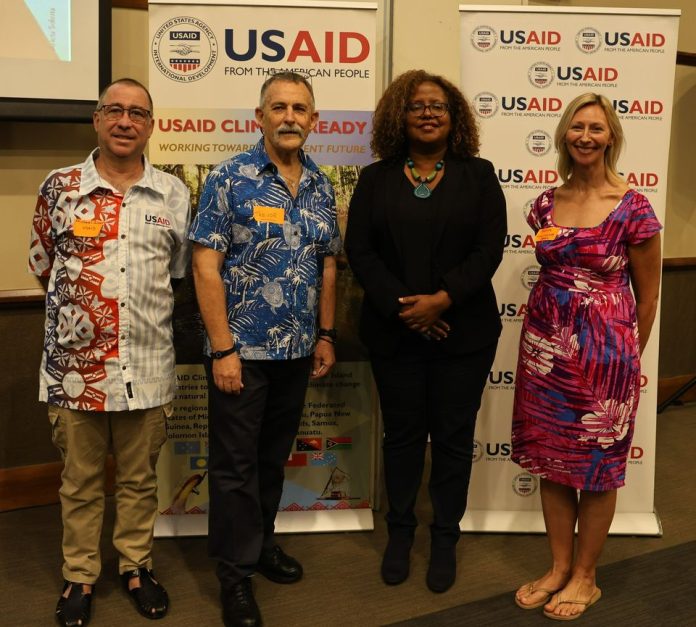The United States Agency for International Development (USAID) Climate Ready project has mobilised US$562 million from Climate Finance Organisations to support Pacific Island countries meet their climate change adaptation goals and become more climate resilient.
This amount includes 17 large projects to improve health, food and water security, marine ecosystems, biodiversity protection, conservation, and natural resource management.
“Over the last seven years, Climate Ready has facilitated support to Pacific Island countries, boosting resilience against the region’s greatest threat to climate change,” said USAID Pacific Islands Mission Director, Zema Semunegus.
“The project has actively worked across the region to move adaptation efforts from plans and policies and improving access to international finance and strengthen local adaptation capacity,” Semunegus said.
Climate Ready facilitated the development of “19 climate change adaptation policies, plans and strategies that assist governments to reach adaptation goals, promoting the accreditation of national and regional entities, fostering the preparation and submission of 86 budget proposals for adaptation activities in the areas including health, food security, water security, and biodiversity and trained more than 2,500 men and women in global climate change adaptation.”
The substantial amount that has been mobilised will enable the community groups, pacific organisations and government organisations, to carry out the projects they sought funding for, which “will directly benefit more than 800,000 people in the Pacific”.
However, USAID Climate Ready Chief of Party, Trevor Ole said accessing adaptation funds can be challenging.
“Countries and national designated authorities need an accreditation strategy, aligned with national climate goals as per their Nationally determined contributions (NDCs), and national education standards.
“Accreditation is not an easy process, it takes years. It’s a long process,” Ole said.
He said some of the organisations in the region have “done very well” but entities in the Pacific that are eligible to apply for funding from climate finance institutions, often do not have sufficient resources or capacity to properly undertake project preparation on their own as it is a costly, technical, and time-intensive process.
This is where USAID Climate Ready partnered with DT Global to implement the project and partnered with Pacific Island governments and regional development partners like the United Nations Development Programme, The Pacific Community and Save the Children Australia to prepare project proposals for funding from climate financers such as the Green Climate Fund, the Global Environment Facility, and the Adaptation Fund.
They have worked in 11 Pacific countries that include the Federated States of Micronesia, Fiji, Kiribati, Republic of the Marshall Islands, Palau, Papua New Guinea, Samoa, Solomon Islands, Tonga, Tuvalu, and Vanuatu.
Ole said that they have been collaborating with Pacific Island countries to make climate change adaptation efforts more equitable and inclusive.
“Climate change impacts can be felt most by those already at a disadvantage, for example, rural women, urban poor and people who have limited access to resources, opportunities and decision-making power and now they find themselves facing additional pressures of the changing climate.
“We’ve ensured that climate change adaptation policies were in place, but also address the needs of women and vulnerable groups.
“Adaptation projects that provide expertise for gender assessments, consultations, that informed project design and agenda policies and action plans that guide implementation of those projects once funded and we’ve trained an equal number of men and women who can now better manage adaptation projects when climate finance starts floating.
“USAID Climate Ready is a climate change project that cares about gender equity when all people are included in climate predictions, adaptation efforts and sharing the benefits, that is when our communities and countries will become truly resilient,” he said.
USAID Pacific Islands Mission Director said impressively 52 percent of the individuals who received training were women, reflecting a rigorous effort towards inclusivity and equity, in line with USAID’S core goals.
“It builds technical skills and technical capacity of men and women to be able to implement quality adaptation projects.
“These newly acquired skills and knowledge that this project has brought forward will contribute to household sustainable development in the face of climate change and will also help ensure adaptation actions beyond the level of this program,” she said.
She highlighted USAID’s commitment to ensure their support that best reflects Pacific Island priorities.
“We are here to listen, to partner and then deliver in ways that promote our shared objectives for a brighter tomorrow, and support the people of the Pacific Islands,” she said.
She said as this project comes to a close, they are working on the design of a new regional climate change project.
“We hope and plan to roll out this new project in the first half of 2024 and I look forward to continuing close collaborations with everyone here and as we all work together to bring about and build a more resilient and sustainable Pacific,” she said.
SOURCE: PACNEWS













